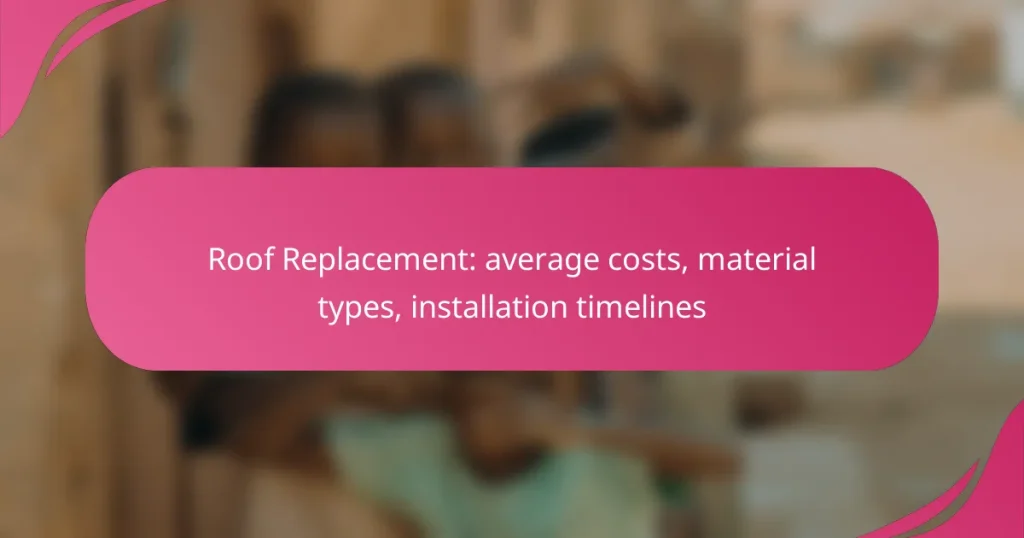Replacing a roof is a significant investment for homeowners, with average costs in Canada ranging from CAD 5,000 to CAD 15,000 based on material type, roof size, and labor expenses. Various roofing materials, including asphalt shingles, metal, tile, and wood shake, each come with distinct advantages and installation requirements. The replacement process can take from a few days to a couple of weeks, influenced by factors like material choice and weather conditions, so planning and selecting a reliable contractor are essential for a smooth experience.
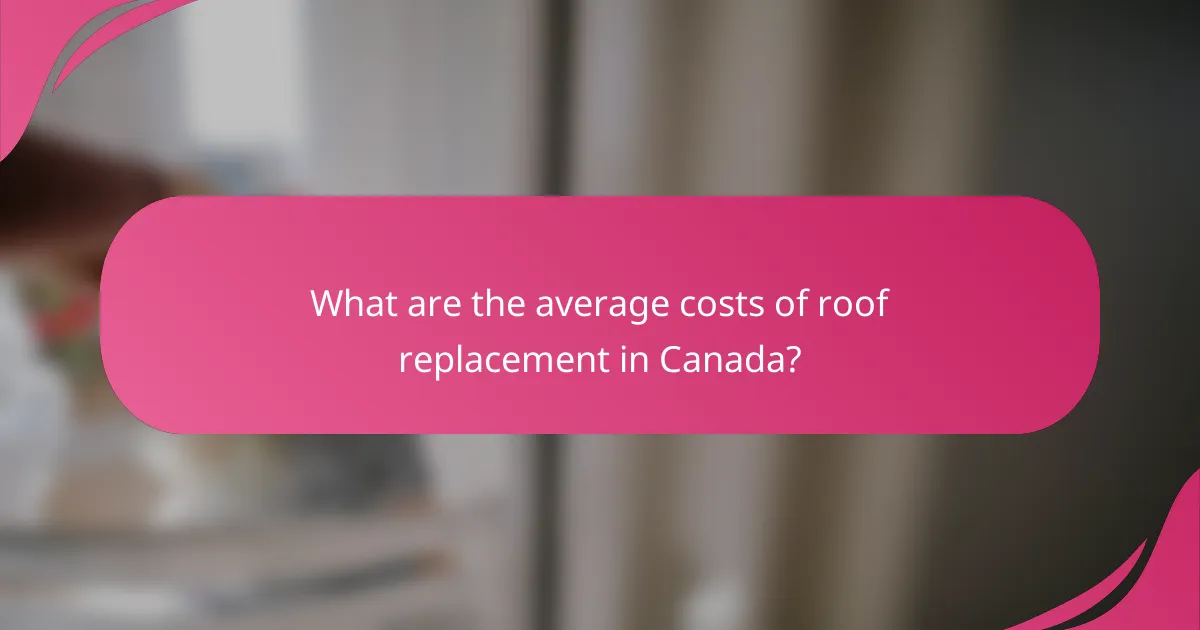
What are the average costs of roof replacement in Canada?
The average costs of roof replacement in Canada typically range from CAD 5,000 to CAD 15,000, depending on various factors such as material type, roof size, and labor costs. Homeowners should consider these elements when budgeting for a new roof to ensure they select an option that meets their needs and financial situation.
Cost range for asphalt shingles
Asphalt shingles are among the most popular roofing materials in Canada due to their affordability and ease of installation. The cost for asphalt shingle replacement generally ranges from CAD 3,000 to CAD 8,000, depending on the quality of shingles and the complexity of the roof design.
Homeowners should expect to pay more for architectural shingles, which offer better durability and aesthetics, compared to standard three-tab shingles. Always factor in additional costs for underlayment and ventilation when calculating total expenses.
Cost range for metal roofing
Metal roofing is known for its longevity and energy efficiency, making it a worthwhile investment. The cost for metal roofing replacement typically falls between CAD 7,000 and CAD 15,000, influenced by the type of metal used, such as steel or aluminum, and the roofing style selected.
Installation costs can be higher due to the specialized skills required for metal roofing. However, the long-term savings on maintenance and energy bills can offset the initial investment over time.
Cost range for tile roofing
Tile roofing, often made from clay or concrete, is highly durable and offers a distinctive aesthetic. The cost for tile roof replacement usually ranges from CAD 10,000 to CAD 25,000, depending on the type of tile and the complexity of the installation.
While tile roofs can be more expensive upfront, their longevity and resistance to harsh weather conditions can provide significant value over the years. Ensure that your roof structure can support the weight of tile materials before proceeding with installation.
Factors affecting roof replacement costs
Other considerations include the time of year for installation, as demand can affect pricing, and whether you choose to hire a contractor or undertake a DIY project. Always obtain multiple quotes to ensure competitive pricing and consider the reputation of contractors to avoid potential pitfalls.
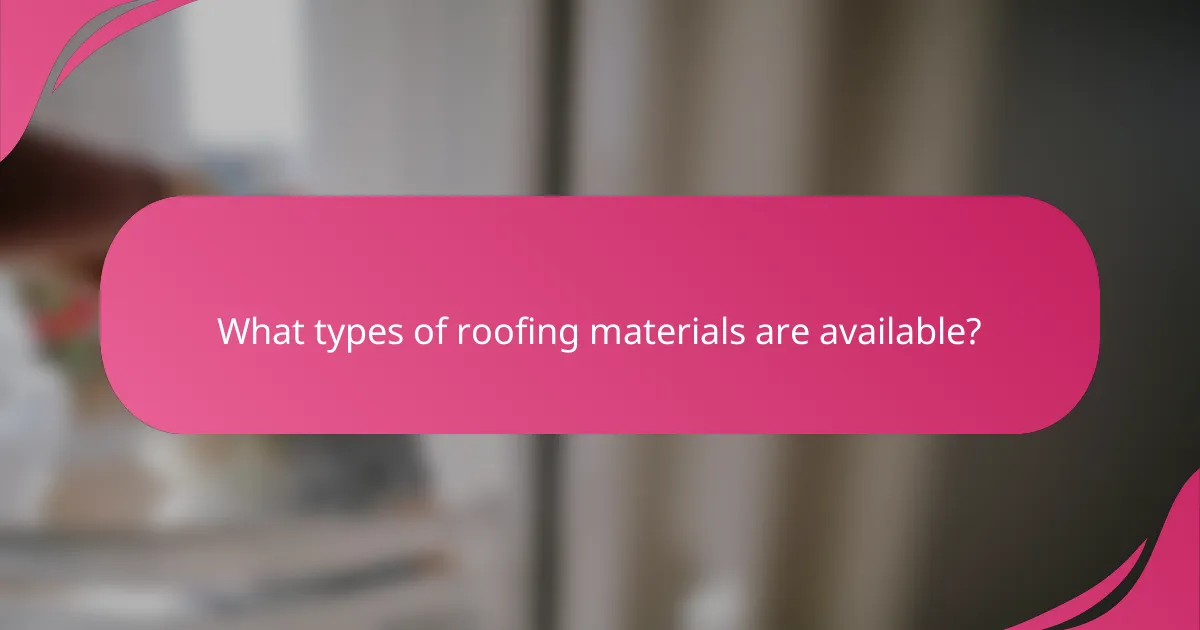
What types of roofing materials are available?
There are several types of roofing materials, each with unique characteristics, costs, and installation requirements. The most common options include asphalt shingles, metal roofing, tile roofing, and wood shake roofing, each offering different benefits and drawbacks.
Asphalt shingles overview
Asphalt shingles are the most popular roofing material in the United States due to their affordability and ease of installation. They typically cost between $90 and $100 per square (100 square feet) and come in various styles and colors.
These shingles are made from a fiberglass base coated with asphalt and granules, providing durability and weather resistance. They usually last around 15 to 30 years, depending on the quality and local climate conditions.
Metal roofing overview
Metal roofing is known for its longevity and durability, often lasting 40 to 70 years. The cost ranges from $150 to $900 per square, depending on the type of metal used, such as steel, aluminum, or copper.
This material is lightweight, fire-resistant, and can reflect solar heat, which may reduce cooling costs. However, installation can be more complex and may require specialized labor.
Tile roofing overview
Tile roofing, made from clay or concrete, is recognized for its aesthetic appeal and exceptional durability, often lasting over 50 years. The cost typically ranges from $300 to $600 per square.
While tile roofs can withstand severe weather conditions, they are heavy and may require additional structural support. Proper installation is crucial to prevent leaks and ensure longevity.
Wood shake roofing overview
Wood shake roofing, usually made from cedar, offers a natural look and good insulation properties. The cost can range from $250 to $600 per square, depending on the quality of the wood and the installation method.
This type of roofing requires regular maintenance to prevent rot and insect damage, and it typically lasts around 20 to 40 years. Local building codes may also regulate the use of wood shakes due to fire safety concerns.
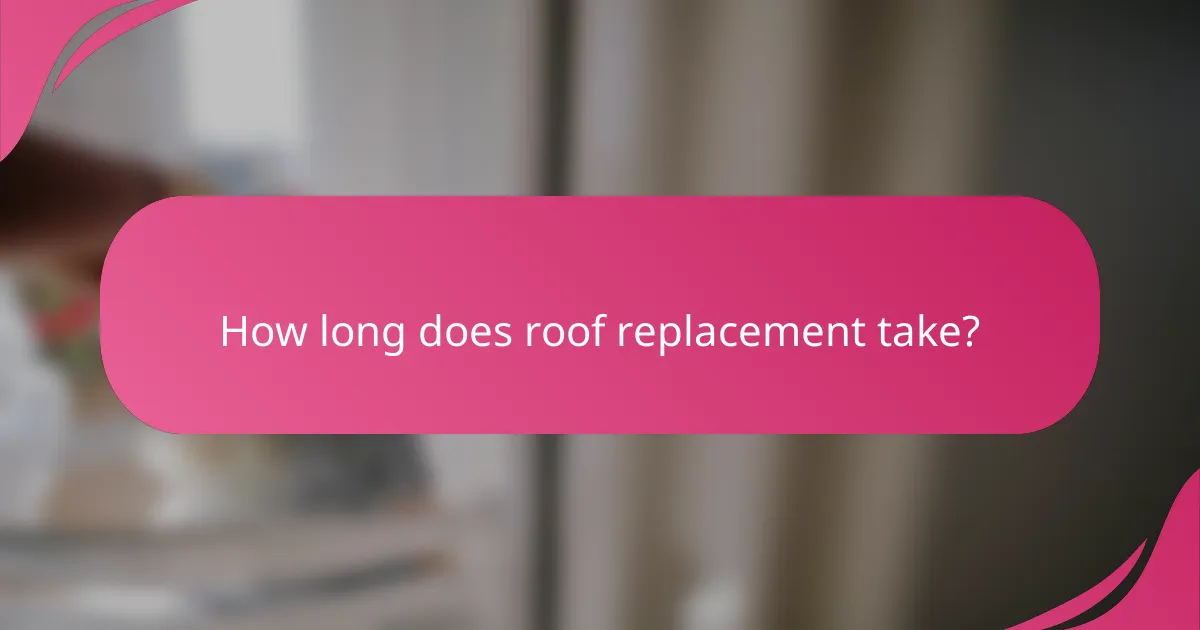
How long does roof replacement take?
Roof replacement typically takes anywhere from a few days to a couple of weeks, depending on various factors such as the type of roofing material, the size of the roof, and weather conditions. Homeowners should plan for potential delays and ensure they have a reliable contractor to manage the timeline effectively.
Average installation time for asphalt shingles
Asphalt shingles are one of the most common roofing materials and usually take about 1 to 3 days to install on an average-sized home. Factors like roof complexity and weather can influence this timeline.
For larger or more complex roofs, installation may extend to a week. It’s crucial to ensure proper ventilation and underlayment during installation to maximize the roof’s lifespan.
Average installation time for metal roofing
Metal roofing installation generally requires 2 to 5 days, depending on the roof’s size and the specific type of metal used. Metal roofs can be more complex to install due to the need for precise measurements and cutting.
Homeowners should consider the benefits of metal roofing, such as durability and energy efficiency, which may justify the longer installation time compared to asphalt shingles.
Average installation time for tile roofing
Tile roofing is more labor-intensive and typically takes 5 to 10 days to install. The weight of the tiles and the need for a strong underlying structure can extend the installation process.
Choosing tile roofing can offer longevity and aesthetic appeal, but homeowners should be prepared for a longer installation period and potentially higher costs compared to other materials.
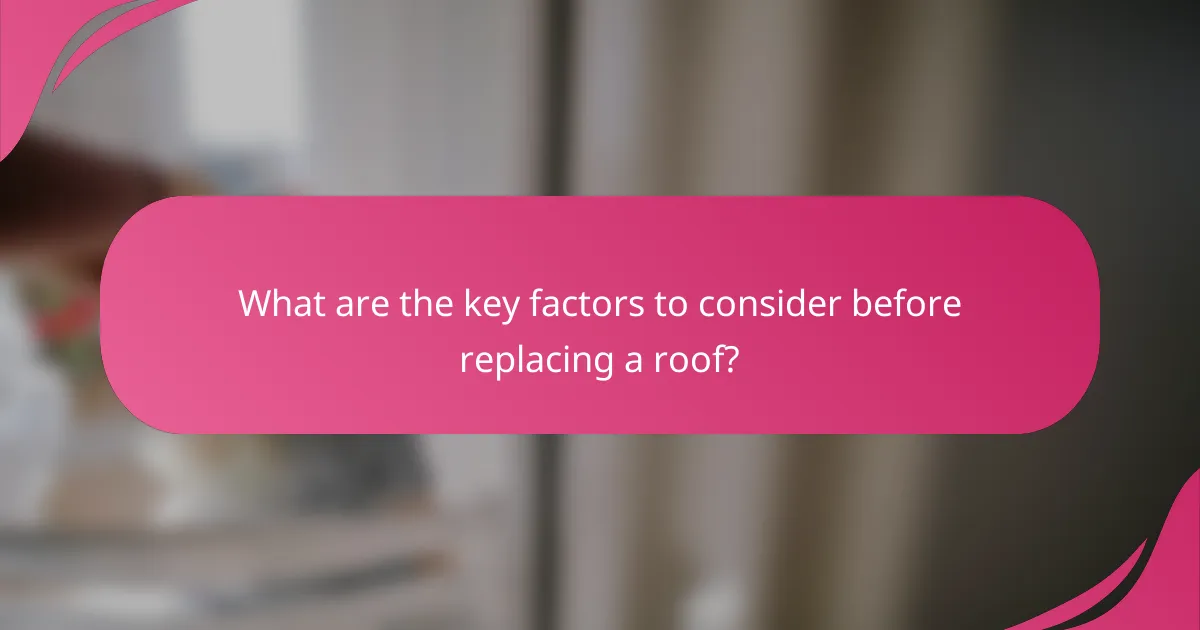
What are the key factors to consider before replacing a roof?
Before replacing a roof, it’s essential to evaluate the roof’s condition, select appropriate materials, and understand local building codes. These factors significantly influence the overall cost, durability, and compliance of your new roof.
Assessing roof condition
Start by inspecting your current roof for signs of damage, such as missing shingles, leaks, or sagging. A thorough assessment helps determine whether a full replacement is necessary or if repairs will suffice.
Consider hiring a professional inspector to evaluate the roof’s structural integrity. This can save you from unexpected costs and ensure that any underlying issues are addressed before installation.
Choosing the right material
Selecting the right roofing material is crucial for longevity and performance. Common options include asphalt shingles, metal, tile, and slate, each with varying costs and lifespans.
For example, asphalt shingles are typically more affordable, ranging from $90 to $100 per square, while metal roofs can cost between $250 and $300 per square. Weigh the pros and cons of each material based on your budget and aesthetic preferences.
Understanding local building codes
Familiarize yourself with local building codes and regulations before starting your roof replacement. These codes dictate materials, installation methods, and safety standards that must be followed.
Check with your local building department to ensure compliance and avoid potential fines or issues during inspections. Understanding these requirements can streamline the installation process and ensure your new roof meets all necessary standards.
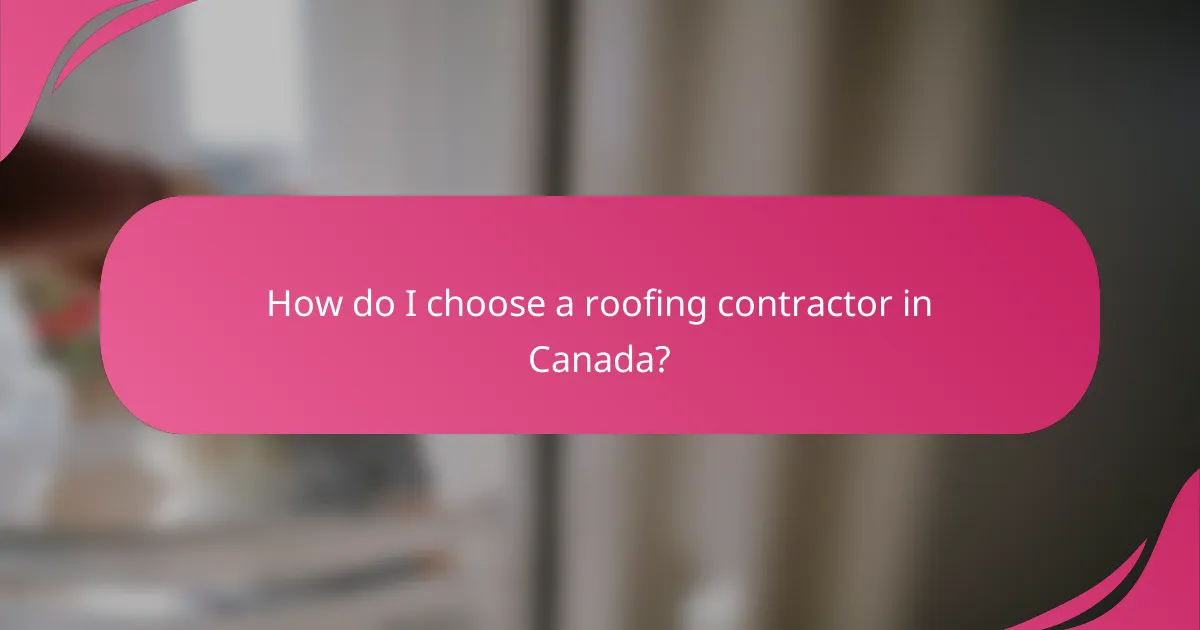
How do I choose a roofing contractor in Canada?
Choosing a roofing contractor in Canada involves evaluating their experience, reputation, and qualifications. It’s essential to select a contractor who understands local regulations and can provide quality workmanship.
Researching local contractors
Start by gathering a list of roofing contractors in your area. Look for companies that have been in business for several years and have a strong local presence. Websites, local directories, and community boards can be valuable resources for finding reputable contractors.
Consider reaching out to friends, family, or neighbors for recommendations. Personal experiences can provide insights into the quality of work and customer service offered by local contractors.
Checking contractor credentials
Verify that the contractor holds the necessary licenses and insurance required in your province. In Canada, roofing contractors should have liability insurance and workers’ compensation coverage to protect you from potential liabilities.
Additionally, check if the contractor is a member of any professional associations, such as the Canadian Roofing Contractors Association (CRCA), which can indicate a commitment to industry standards and best practices.
Reading customer reviews
Customer reviews can offer valuable insights into a contractor’s reliability and quality of work. Look for reviews on platforms like Google, Yelp, or specialized home improvement websites to gauge overall satisfaction.
Pay attention to both positive and negative feedback. A contractor with a few negative reviews might still be a good choice if they respond professionally and resolve issues effectively. Aim for contractors with consistently high ratings and positive testimonials.
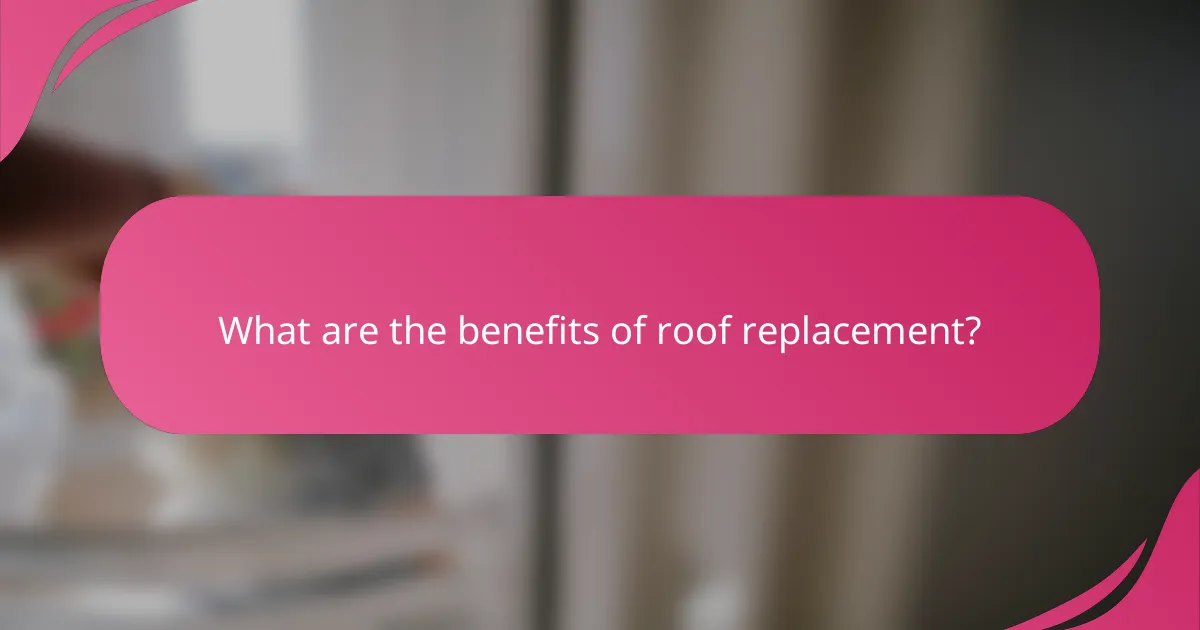
What are the benefits of roof replacement?
Roof replacement offers numerous advantages, including enhanced protection for your home and improved energy efficiency. A new roof can also increase property value and curb appeal, making it a worthwhile investment.
Improved energy efficiency
Replacing an old roof can significantly enhance your home’s energy efficiency. Modern roofing materials, such as reflective shingles or metal roofing, can help reduce heat absorption, leading to lower cooling costs during hot months.
Consider insulation quality and ventilation when replacing your roof. Properly installed insulation can prevent heat loss in winter and keep your home cooler in summer, further contributing to energy savings. Look for materials with high energy ratings to maximize benefits.
To ensure optimal performance, consult with roofing professionals about energy-efficient options that suit your climate. This investment can lead to savings on utility bills, often recouping costs over time through reduced energy consumption.
